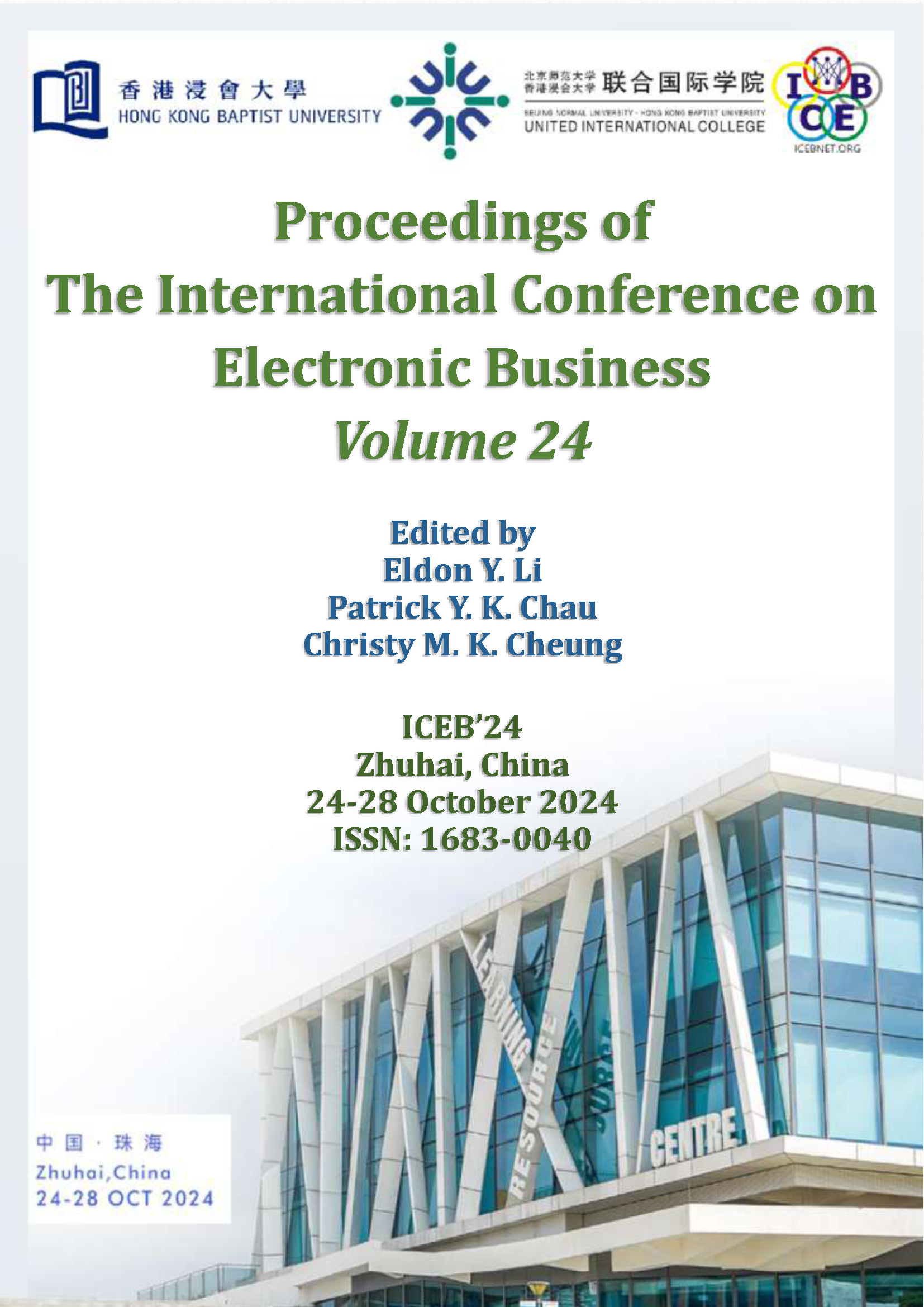|
1.
|
A systematic literature review on impulse buying in e-commerce live streaming with co-occurrence map
Fuyume Sai, Yi Cheng Lu and Ruo Lan Lin
|
1
|
|
2.
|
Achievement gamification affordances in e-commerce platforms: An empirical study involving online shopping festival
Yanhong Chen, Yuxin Li and Yaner Yang
|
9
|
|
3.
|
AI product management personnel demand study—Based on analysis of chinese market recruitment information
Shuai Chen and Yang Zhao
|
23
|
|
4.
|
AI utilization and governance in corporate entrepreneurship: Investigating the moderating influence of top management
Chuyi Fang, Hanyun Li and Yuting Wang
|
32
|
|
5.
|
Artificial intelligence agents as team leaders : A study of the impact on team climate and team effectiveness
Qiong Jia and Yan Zhang
|
44
|
|
6.
|
Boosting e-commerce sales with live streaming: A perspective on live streamers’ personality traits
Yixin Wang, Jiang Wu, Ting Chen, Haoyu Zhou, Honghao Ding and Xi Chen
|
54
|
|
7.
|
Call the shots or follow suit? Research on the evolution of artificial intelligence scientific collaboration networks from a leadership-participation perspective
Chaocheng He, Jiaxin Du and Jun Zhang
|
65
|
|
8.
|
Canvas for IT/IS—A literature review and a framework
Carolina Cerqueira, Margarida Sequeira, João Varajão, Carlos Sousa Pinto and Márcia Veloso
|
76
|
|
9.
|
Comparison of virtual idols and virtual streamers: From the perspective of design features
Qingwei Wang, Boying Li, Chee-Wee Tan, Alain Chong, Xiaotong Liu, Rongyue Chen, Yijian Zhang, Xiying Xie and Zhuohan Wang
|
89
|
|
10.
|
Conservation research and design application of cultural heritage digitization
Jie Wang, Meng Na Yan and Gabriella Medvegy
|
98
|
|
11.
|
Deconstructing supply chain resilience under big data analytics capability: Exploring the mediating and moderating roles of agility and top management participation
Yuting Wang, Xinran Qian and Chuyi Fang
|
108
|
|
12.
|
Differences of consumer reviews and consumer satisfaction on cross-border e-commerce platforms: A text mining analysis based on cross-cultural perspective
Ruoxin Zhou, Yuting Zhu, Runqi Zheng and Jilei Zhou
|
122
|
|
13.
|
Differing the impacts of individual and group knowledge seeking/contribution behaviors on knowledge sales in online Q&A platform: The moderating role of knowledge contributor category
Nan Wang, Hao Zhang and Xiabing Zheng
|
130
|
|
14.
|
Emerging trends and new developments in emergency logistics
Yuyang Luo, Qing Liu, Xuanchen Shuai, Yuanhao Meng and Liang Zhou
|
140
|
|
15.
|
Establishing a Data Analytics Stage Model (DASM): Integrating “open coding” and conceptual mapping for enhanced maturity assessment
Shuo Yan and Jeff Jones
|
152
|
|
16.
|
Exploring cutting-edge data visualization: Unveiling opportunities and overcoming challenges in thai journalism amid AI disruption
Sasina Eichinger and Noptanit Chotisarn
|
163
|
|
17.
|
Exploring the Big Five personality tendencies of Chinese plant-based meat consumers
Meimei Luo, Shuwen Wu and Chenguang Hu
|
176
|
|
18.
|
Factors affecting blockchain technology acceptance: An empirical study
Meiling Zeng and Fuyume Sai
|
188
|
|
19.
|
Financial inclusion and fintech ecosystems in the digital age: A systematic review and meta-analysis
Usama Zafar and Eldon Y. Li
|
196
|
|
20.
|
From play to workout: How VR fitness game design enhances user engagement?
Wanxing Dai and Yan Li
|
209
|
|
21.
|
Gaining insights into data sharing process among multiple stakeholders through process mining and social network analysis
Lihua Wu and Ying Wang
|
217
|
|
22.
|
How live stream session is developed to guide value co-creation between streamer and audience: an ethnographic investigation based on Dramaturgical Theory
Bosen Lin, Yihan Wang, Fangfang Hou, Boying Li and Zhengzhi Guan
|
235
|
|
23.
|
How virtual face video engage consumers: A moderated mediation model for the underlying mechanisms
Shuang Geng, Elham Poorahmadi, Rui Wang, Yuefeng Qian and Yanghui Li
|
247
|
|
24.
|
Impact of downvotes on bot and user engagement in a blockchain-based social media platform
Zhihong Li, Zhengnan Xiao, Hao Song and Xiaoying Xu
|
257
|
|
25.
|
Impacts of tightening policies on live-streaming platforms' financial performance
Yixuan Li and Benjamin Yen
|
271
|
|
26.
|
Investigating information systems integration and health regulation in immunisation supply chain visibility
Kittikorn Kasaetip, William Yu Chung Wang and Mina Cu
|
283
|
|
27.
|
Motivated endeavor in catching attention: The impact of conversion tool on sponsored post engagement
Ying Ji, Chaoyue Gao and Qiang Ye
|
291
|
|
28.
|
Optimization strategy analysis of virtual live streaming e-commerce based on LDA topic model
Ji Luo, Xuewen Gui, Yanling Xu, Wenbo Peng
|
300
|
|
29.
|
Optimizing inventory management using a multi-agent LLM system
Zhihong Li, Albaraa Ksibi and Xiaoying Xu
|
308
|
|
30.
|
Perceptions of ambivalence in cause-related marketing: Exploring the impact of mixed motivational signals on consumer evaluations
Yuting Wang, Yao Chen, Jie Fang and Bingqing Xiong
|
319
|
|
31.
|
Privacy-preserving railway data sharing: A comparative study of homomorphic encryption schemes
Chengxi Gao, Ying Wang and Lei Huang
|
329
|
|
32.
|
Research on the willingness of college students to use AI assistance in cross-cultural learning
Wei Huang, Ziyi Zhang and Yitang Zeng
|
338
|
|
33.
|
Review of research on technostress in healthcare literature review
Yumei Luo, Yongxin Tan, Qian Gao and Jialiang Zheng
|
347
|
|
34.
|
Study on the performance measurement and comparison of China's pharmaceutical industry based on big data analysis
Shan Wang and Renji Liu
|
360
|
|
35.
|
The application of digital twin in design
Hangyu Qu, Lijun Xu, Lu Chen, Yaxin Zheng and Hansong Wang
|
368
|
|
36.
|
The effects of mandatory work-from-home strength on job performance: An investigation into the mediating role of emotional exhaustion during the COVID-19 pandemic in China
Ziyun Zhao
|
379
|
|
37.
|
The impact of artificial intelligence policy on employment: Evidence from China
Jiafu Wang and Wei Hu
|
391
|
|
38.
|
The impact of generative artificial intelligence voiceover technology on user viewing behavioral intentions for short video film and television commentary on short video platforms
Zihan He, Weihao Zhao and Lan Yao
|
404
|
|
39.
|
The impact of humorous apology expression on consumer forgiveness and trust rebuilding after trust violations
Junran Zhang and Nan Wang
|
423
|
|
40.
|
The impact of live comment characteristics on subsequent live streaming sales and user retention
Haoming Kang and Ting Xu
|
433
|
|
41.
|
The impact of storytelling marketing in short videos on consumers' impulsive purchasing behavior
Yitang Zeng, Yuxin Liu, Xue Yang and Li Li
|
441
|
|
42.
|
The impact of vtuber endorsements on consumer satisfaction and brand loyalty in digital marketing
Kai Lin Hsu and Wei-Hsi Hung
|
450
|
|
43.
|
The impacts of app violation notification on companies' market value
Shuo Geng, Shiyun Hao, Weihua Li and Xiong Zhang
|
458
|
|
44.
|
The role analysis of GenAI for college students—Evidence from China
Zitong Huang, Nuoni Peng, Yu Han, Bin Huang and Jiayin Qi
|
469
|
|
45.
|
The role of AIGC simulation environments in enhancing e-commerce Skills: A study based on cognitive load theory
Kun Tian and Jing Xin
|
481
|
|
46.
|
Understanding the effects of intrinsic and extrinsic cues on consumers’ emotional trust in live streaming e-commerce
Xinru Han, Yongqiang Sun and Ying Wang
|
492
|
|
47.
|
Understanding the physicians’ usage intention of big data analysis in decision making
Shin-Yuan Hung, You-Ta Wu, Jj Hsieh and Yi-Jhen Li
|
506
|
|
48.
|
Understanding the relationship between usage of generative artificial intelligence tools and learning performance: A dual-path perspective
Zihan Zeng and Yongqiang Sun
|
520
|
|
49.
|
Unravelling the algorithm manipulation behavior of social media users: A configurational perspective
Hanbi Fu and Yongqiang Sun
|
536
|
|
50.
|
Unveiling the influence of streamer characteristics and consumer experiences on purchase intention in live commerce
Yuning Qian, Fangfang Hou, Boying Li, Zhengzhi Guan and Teng Ma
|
551
|
|
51.
|
Useful Excel data validation of Qualtrics respondent data prior to analysis
John Hamilton, Stephen Maxwell and Singwhat Tee
|
566
|
|
52.
|
What technological factors influence Chinese college student engagement in a smart classroom learning environment: Ease of use, perceived usefulness, or multiple sources?
Jing Wu
|
576
|
|
53.
|
What you see isn’t what it is: Understanding the impact of smartphones on interpersonal connections
Anila Jan and Eldon Y. Li
|
587
|
|
54.
|
Will sentiment extraction based on ChatGPT yield better predictive outcomes? Evidence from an online travel agency
Zhihao Li, Funyi Chan, Chaoyue Gao and Qiang Ye
|
601
|




